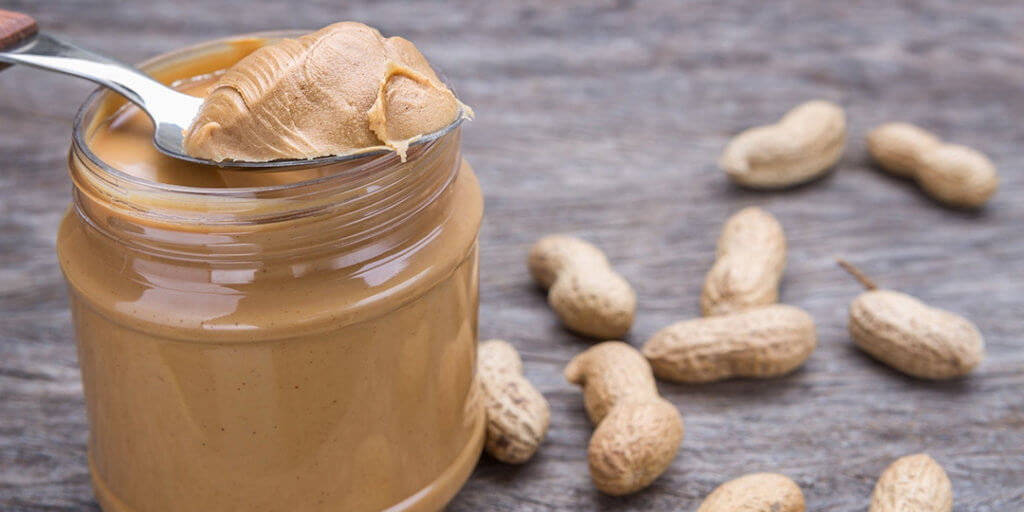
The National Institute of Allergy and Infectious Diseases (NIAID) issued new clinical guidelines on January 5, 2017 regarding the prevention of peanut allergy. The new guidelines were an addendum to the 2010 Guidelines for the diagnosis and management of food allergy.
The new guidelines recommend that parents introduce their children to peanut butter and peanut containing foods as infants, starting as early as 4-6 months of age. This is a stark contrast from previous recommendations that suggested parents delay exposure to peanut containing foods until the child is much older.
Peanut allergies can often be severe or even life threatening. They tend to begin in early childhood and last all the way through adulthood. Because the allergic reactions can be so severe, people with peanut allergies have to be extremely vigilant about what they eat and even the environments they are exposed to. This can be extremely stressful for parents and other sufferers of peanut allergies. The new guidelines aim to reduce the burden of that stress by reducing the number of people who develop a severe peanut allergy.
The recommendations changed based on the results of clinical trial that showed that early consumption of peanut containing foods greatly reduced the risk of developing peanut allergy. According to the NIAID:
Recent scientific research has shown that peanut allergy can be prevented by introducing peanutcontaining foods into the diet early in life. Researchers conducted a clinical trial called Learning Early About Peanut Allergy (LEAP) with more than 600 infants considered to be at high risk of developing peanut allergy because they had severe eczema, egg allergy, or both. The scientists randomly divided the babies into two groups. One group was given peanut-containing foods to eat regularly, and the other group was told to avoid peanut-containing foods. They did this until they reached 5 years of age. By comparing the two groups, researchers found that regular consumption of peanut-containing foods beginning early in life reduced the risk of developing peanut allergy by 81 percent. [1]
The new recommendations are divided into three separate guidelines. Guideline 1 is the recommendations for infants with severe eczema, egg allergy, or both. Infants with these symptoms are most at risk for developing a peanut allergy. Guideline 2 is for infants with moderate eczema, as infants with this symptom still have an elevated risk of developing a peanut allergy. Guideline 3 is for infants that have no eczema or food allergies of any kind. The three guidelines are as follows:
Guideline 1
Guideline 1 recommends that if your infant has severe eczema, egg allergy, or both (conditions that increase the risk of peanut allergy), he or she should have peanut-containing foods introduced into the diet as early as 4 to 6 months of age. This will reduce the risk of developing peanut allergy. Check with your infant’s healthcare provider before feeding your infant peanut-containing foods. He or she may choose to perform an allergy blood test or send your infant to a specialist for other tests, such as a skin prick test. The results of these tests will help to determine if peanut should be introduced into your infant’s diet and, if so, the safest way to introduce it. If your infant’s test results indicate that it is safe to introduce peanut-containing foods, the healthcare provider may recommend that you introduce peanut-containing foods to your infant at home. Or, if you prefer, the first feeding may be done in the healthcare provider’s office under supervision. On the other hand, testing may indicate that peanut should be carefully introduced at a specialist’s facility or not introduced at all because your child may already have developed an allergy to peanut. Follow your healthcare provider’s instructions for introducing peanut-containing foods to your infant.
Guideline 2
Guideline 2 suggests that if your infant has mild to moderate eczema, he or she may have peanut containing foods introduced into the diet around 6 months of age to reduce the risk of developing peanut allergy. However, this should be done with your family’s dietary preferences in mind. If peanut containing foods are not a regular part of your family’s diet (and your infant does not have severe eczema, egg allergy, or both), do not feel compelled to introduce peanut at such an early stage. Your child’s healthcare provider can tell you whether your child’s eczema is mild to moderate. You may then choose to introduce peanut-containing foods at home. However, if you or your healthcare provider prefer, the first feeding can be done in the provider’s office under supervision.
Guideline 3
Guideline 3 suggests that if your infant has no eczema or any food allergy, you can freely introduce peanut-containing foods into his or her diet. This can be done at home in an age-appropriate manner together with other solid foods, keeping in mind your family’s dietary routines and preferences as described in Guideline 2. [2]
You can find the full Addendum guidelines for the prevention of peanut allergy in the United States: Report of the National Institute of Allergy and Infectious Diseases here.
REFERENCES
- Addendum Guidelines for the Prevention of Peanut Allergy in the United States, Summary for Parents and Caregivers (January, 2017). National Institute of Allergy and Infectious Diseases; National Institutes of Health; U.S. DEPARTMENT OF HEALTH AND HUMAN SERVICES. p. 1 "New Clinical Trial Results on Peanut Allergy Prevention". https://www.niaid.nih.gov/sites/default/files/peanut-allergy-prevention-guidelines-parent-summary.pdf
- Addendum Guidelines for the Prevention of Peanut Allergy in the United States, Summary for Parents and Caregivers (January, 2017). National Institute of Allergy and Infectious Diseases; National Institutes of Health; U.S. DEPARTMENT OF HEALTH AND HUMAN SERVICES. p. 2. https://www.niaid.nih.gov/sites/default/files/peanut-allergy-prevention-guidelines-parent-summary.pdf
